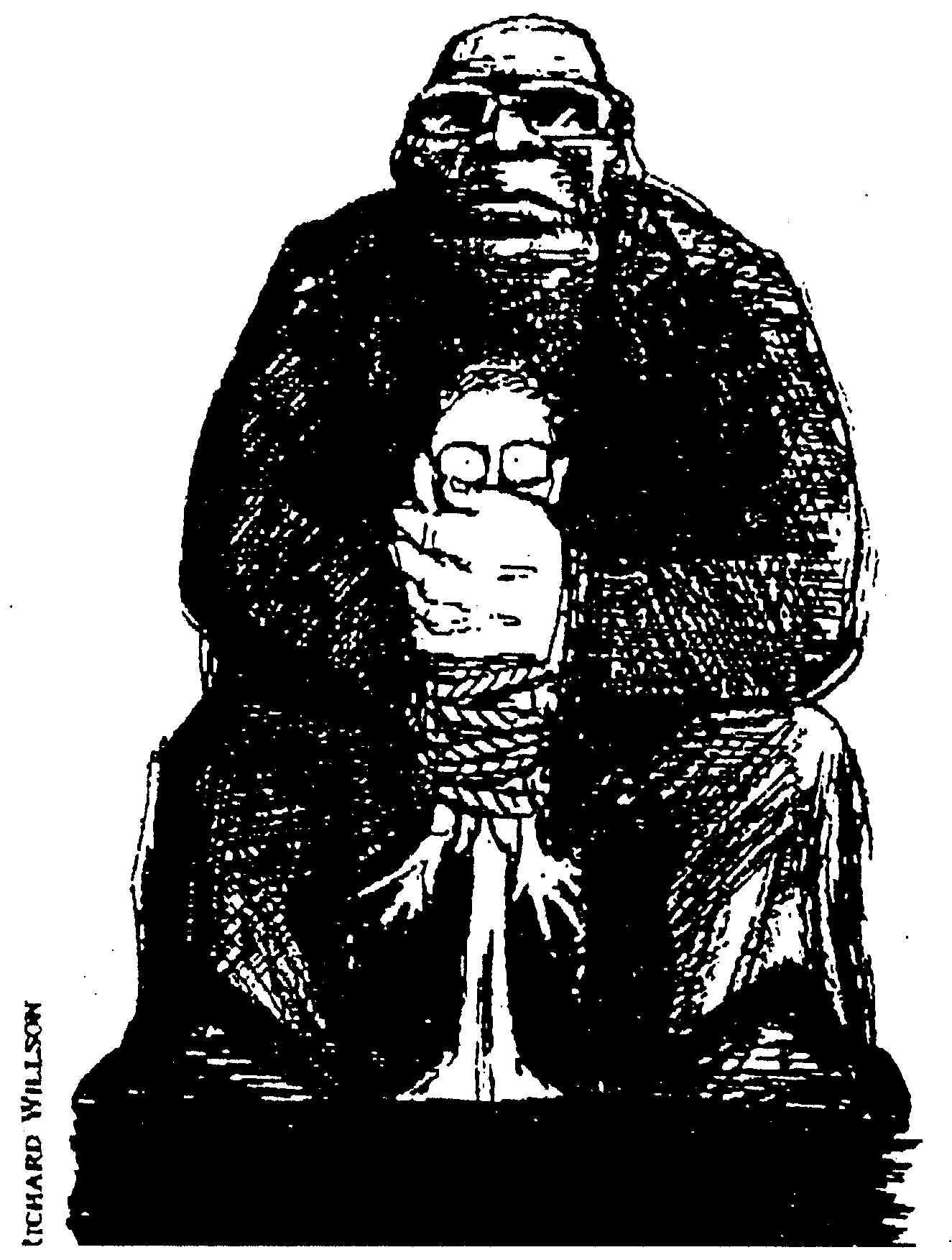

Direct suppression occurs when:
A person makes a public statement or does something that is seen as a threat to the powerful interest group. The group most commonly is a government, industry or profession, but could be, for example, a trade union, church or environmental organisation.
As a result, action is taken in an attempt to stop or penalise the person or activity.
Indirect suppression can occur because of the way in which powerful interest groups control major institutions. This applies particularly in employment and education. Individuals who find the institutionalised ideas irrelevant to their own have their own ideas suppressed through lack of opportunity. They can also experience direct suppression if they attempt to bring about change.
Self-censorship often occurs because people are worried about risking their jobs, promotion prospects or ability to live without threat in their community, or because they fear direct suppression. Self-censorship makes overt suppression unnecessary.
Methods used against critics include:
While these are common methods used to attack critics, the reasons given are different. In almost every case, those who take action against dissidents say that the reason is poor performance by the dissident or something else that is the dissident's fault, especially an attack on the dissident's personality.
How can anyone be sure suppression is involved? There's no way of being absolutely sure. But the following factors are good indicators.
Action is not taken against others who are similar to the person attacked except that they have not done anything threatening to the interest group. This is the double standard test.
There is a pattern of attacks on critics in the area. (But note that most attacks are not public knowledge.)
In many cases, those who are suppressed are said to have brought it on themselves. Often, their personalities are criticised. They are said to be touchy or abrasive or paranoid. When listening to such comments, use the double standard test. Are there other people who are touchy, abrasive or paranoid? Have they been attacked too?
Remember, too, that people who are attacked may quite justifiably be affected psychologically. For most dissidents, suppression is hard to deal with. It also often becomes the person's primary concern, driving others away. Dissidents shouldn't be blamed for difficulties which have been brought on them by others.
A few dissidents are saints, but most are normal human beings with the usual range of human frailties. Some dissidents have quite nasty personal characteristics. But in every case, dissent should be protected. The focus should be on opposing suppression and ensuring freedom of speech, not on the psychology of those attacked.
Not everyone who speaks out is attacked. Only some are. Why? There are all sorts of factors involved. For suppression to occur, someone must take action against the dissenter. Personalities play a role.
There are some regularities in suppression. For example, there are many documented cases of suppression of political radicals (left-wing and, more occasionally, right-wing), feminists, people who expose corruption, and critics of nuclear power, forestry, fluoridation or pesticides. In some areas - such as automobile safety - there are few cases of suppression because there are few public critics.
The actions which can be called suppression most often are implemented by people in positions of power in organisations or associations. This means business executives, government officials and leaders in professions (law, medicine). Usually, the attacks on a person come from their superiors: for example, attacks against academics who speak out more often come from university administrations than from outsiders.
It is helpful to assume that those who are responsible for suppression are sincere. They really believe that the dissident is incompetent, unauthorised or whatever, and that their own behaviour is quite justified. To call something suppression is to challenge the explanations given by those in power.
Suppression can cause large costs to society. Among those suppressed are:
But suppression is undesirable for a more fundamental reason. Freedom of speech is central to a free society. It is necessary so that all points of view can be presented and considered. Dissent should be encouraged rather than discouraged.
Freedom of speech should be available to all, including employees. When employees in government or industry are inhibited from speaking out through fear for their jobs, society suffers. Powerful organisations that claim to serve the public interest should be able to tolerate critics. Indeed, they need criticism to make them more effective.
Sharon Beder, a trained engineer, was a key figure in generating concern in Sydney about the discharge of sewage and industrial waste into the ocean. Many engineers in the Water Board were extremely hostile to anyone who questioned the Board's policies. One top member of the Institution of Engineers, the key professional body, threatened Beder with the possibility of a disciplinary tribunal. Ironically, a code of professional ethics was invoked to try to silence a critic.
Mark Diesendorf, coordinator of the Australian Conservation Foundation's Global Change Programme, in 1990 criticised statements by Dr Brian O'Brien, formerly head of the Western Australia Environmental Protection Authority, which minimised the likely impacts of the greenhouse effect. Diesendorf also pointed out that O'Brien's employment as a consultant to the coal industry should be taken into account when evaluating his views. O'Brien issued proceedings for defamation against both Diesendorf and the ACF. The case was settled out of court through a carefully-worded apology.
David Obendorf, a government veterinarian in Tasmania, spoke out about the risks involved in dismantling animal health surveillance in Australia. He was dismissed from his position and, after more than four years of struggle, he finally received a public apology from the Tasmanian government in 1997.
Lesley Pinson worked as an auditor at State Rail in New South Wales. She discovered evidence of safety problems, fraud, and sexual and racial harassment. In response to her allegations, management did nothing except try to shut her up, and eventually dismissed her. Her allegations were given to the Independent Commission Against Corruption, which referred them back to State Rail.
In 1978, Mick Skrijel, a crayfisherman, attempted to expose police and political protection of drug trafficking in South Australia. In 1985 he was charged by the National Crime Authority and imprisoned, but on appeal was released and his conviction quashed. In 1995 a government-appointed investigator called for a royal commission into the affair. Federal governments have remained silent.

The Giraffe Project encourages people to "stick their necks out" to serve the public interest, and commends those who do.
This seldom is successful in stopping suppression. Often the attacks continue. Furthermore, no support is generated for the dissident.
If critics decide to toe the line and "lie low," then after a period - often years - they may be accepted back into the fold. This acquiescence means that future critics are likely to encounter the same difficulties.
This includes talking to the attackers, trying to sort out misunderstandings, explaining one's actions, etc. This can be successful when the suppression was a mistake or when, as occasionally happens, those involved are willing to change. But in many cases the attackers are unwilling to reconsider their actions.
This means making formal appeals against decisions, using internal grievance procedures, bringing cases before the Ombudsman or the Human Rights and Equal Opportunity Commission, or launching court actions. This sometimes helps, but usually only in the most blatant or cut-and-dried cases. The disadvantages of formal channels are that organisations have a large advantage in resources, there are long delays and only narrow aspects of the case are dealt with.
Several Australian governments have introduced or are considering legislation to protect whistleblowers from reprisals. This sounds like an excellent idea, but it has severe limitations. The legislation can only cover certain types of individuals, typically public servants, and particular types of dissent. But many types of problems are hard to legislate against, such as subtle harassment campaigns and blocking of appointments.
Legislation has potent symbolic value. On the one hand, it may legitimate dissent. On the other hand, it may give the appearance that something is being done about suppression when actually little has changed.
When unions or staff associations take up defence of a dissident, this can be very effective. But in many cases they have no special brief to intervene (such as when editors censor publications) or, worse, may side with the attackers.
This could be a small and "in-house" operation involving circulation of a summary of the case to friends and colleagues and asking them to write letters or it could be a major public campaign with stories in newspapers and on television. Publicity is undoubtedly an extremely potent method of opposing suppression. Furthermore, journalists often are interested in suppression cases because they make a good story. The disadvantage is that publicity can easily get "out of control" of the dissident and may aggravate a polarised situation.
It is vitally important that action be taken against suppression. This is because the most important effect of suppression is not on the dissident - though that may be traumatic - but on others who observe the process. Every case of suppression is a warning to potential critics not to buck the system. And every case in which suppression is vigorously opposed is a warning to vested interests that attacks will not be tolerated.
Dissent Network Australia (DNA) is designed to bring together
individuals who have experienced or are concerned about suppression
of dissent. We aim to develop strategies for publicising and
challenging suppression in Australia. We invite you to support the
goals of the network in some of the following ways.
Isla MacGregor, 24 Summerleas Road, Fern Tree, Tasmania 7054, phone 0497 635 503
Brian Martin, University of Wollongong, NSW 2522, phone (02) 4228 7860, email: bmartin@uow.edu.au
Pdf of this leaflet, as published in Social Medicine, vol. 6, no. 4, May 2012, pp. 246-248
This leaflet is located on
Suppression of dissent website
in the section on Basic information